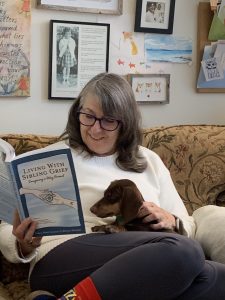November is Worldwide Bereaved Siblings Month, a time to recognize the unique and often overlooked grief that follows the death of a brother or sister.
Sibling grief is one form of disenfranchised grief, the kind of grief that society too often fails to acknowledge or validate. Siblings are sometimes called “the forgotten mourners,” as their loss can be overshadowed by attention given to parents, partners, or children of the deceased. But the bond between siblings is one of the most significant and enduring relationships in life and the grief that comes from its loss can last a lifetime.
“Sibling grief is one of the least acknowledged forms of grief, despite siblings often being our longest and most formative relationships. Greater awareness through publications and social media in the realm of grief education and the need for establishing peer grief groups are essential supports needed for navigating a sibling’s unique and enduring bereavement.”
— Earla Legault, co-author of Living with Sibling Grief: Imagining a Way Forward, and Chilliwack Hospice Society volunteer

Earla Legault
Why sibling grief matters
From childhood through adolescence and into adulthood, sibling relationships help shape our sense of identity. They are our first companions and rivals, our teachers and protectors, and the people who know our history from the beginning. Many siblings share decades of life together, often more time than with anyone else. Research has shown that siblings spend up to a third of their early years together, more than with parents, teachers, or friends.
Despite the closeness of this bond, the grief that follows a sibling’s death is rarely recognized for its depth or duration. Our culture tends to give less acknowledgement to sibling relationships, even though they are nearly universal and profoundly formative. When a sibling dies, it can feel as though part of one’s own identity is gone — a missing chapter in the story of one’s life.
What sibling grievers wish others knew
There is no hierarchy in grief. While the death of a sibling may be viewed by some as “lesser” than other losses, the pain can be immense. Many adults assume their brothers or sisters will always be there, a steady presence through milestones and change. When that expectation is suddenly broken, the result can be deep sorrow, disorientation, and even guilt for surviving.
Siblings who are grieving often need to self-advocate for their emotional needs. At home, in friendships, and at work, they may find themselves setting boundaries or seeking understanding in environments where their loss is not easily recognized. Taking time for rest, creative expression, or quiet reflection can help create space for healing.
How to support someone grieving a sibling
Support begins with simple acknowledgement. Recognize that the death of a sibling leaves a lifelong impact — it’s not something to “get over” or “move on from.” Grief doesn’t end; it changes shape over time.
Offering empathy rather than advice is one of the most meaningful ways to help. Invite your friend or colleague to talk about their sibling, share stories, or find ways to keep their memory present. Encourage rituals of connection such as lighting a candle, marking birthdays, or finding a special way to honour the bond they shared.
For those who are grieving, learning about grief education and theories can provide helpful context for what they are experiencing. Understanding that healing is about adapting rather than accepting can make space for a gentler and more sustainable journey.
Moving forward
Grief changes us, but it does not have to isolate us. By speaking more openly about sibling loss, we can help people feel seen, validated, and supported.
If you are grieving the death of a sibling, know that your relationship mattered deeply and so does your grief. You are not alone in moving forward to navigate this deep loss.
For local grief support and peer groups, please contact Lucy Fraser, MSW, Director of Programs at Chilliwack Hospice Society at (604) 795-4660 or visit www.chilliwackhospice.org.
Chilliwack Hospice Society extends heartfelt thanks to volunteer and author Earla Legault for contributing her insights and expertise to this article. Earla is the co-author of Living with Sibling Grief: Imagining a Way Forward and has dedicated her work to raising awareness of sibling bereavement through education, writing, and peer support.




